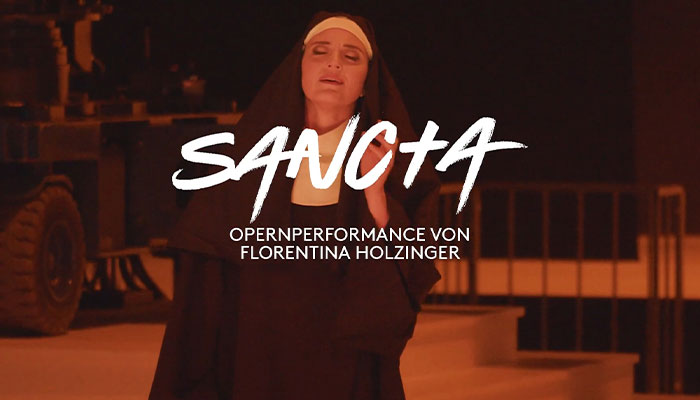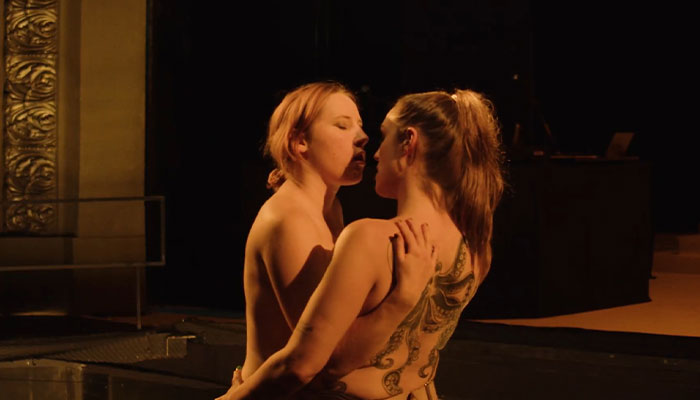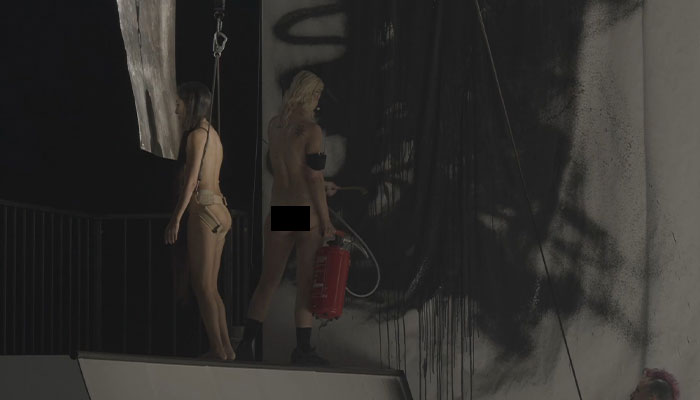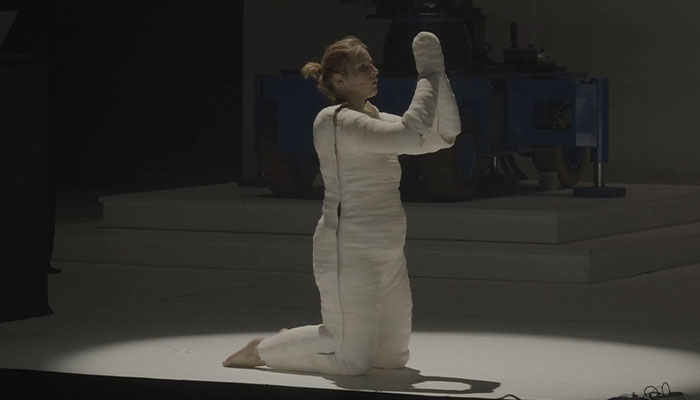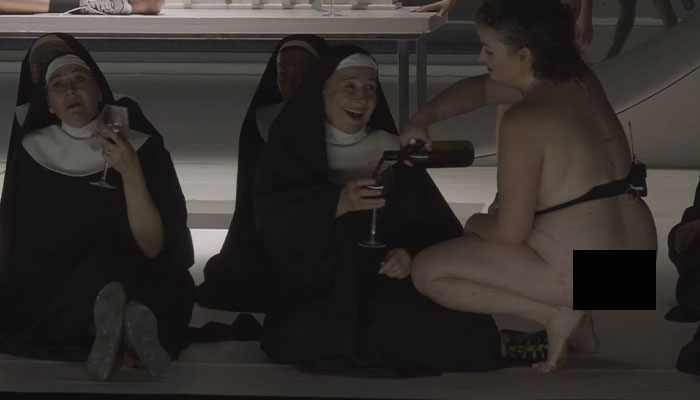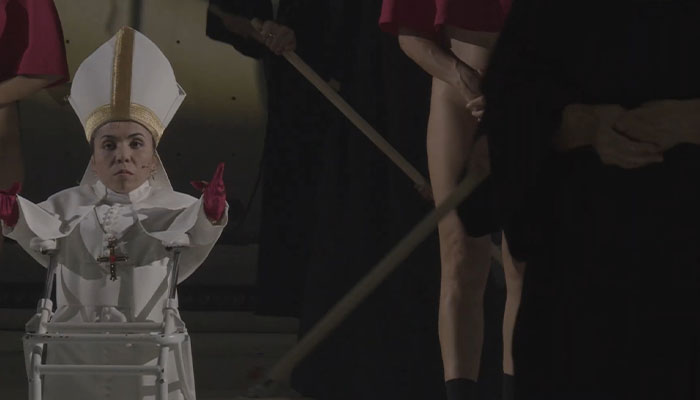Trigger warning: sensitive content On Saturday (October 5), eight people at the theater required care from an emergency doctor. The following day, ten more cases were reported of visitors who left after feeling sick. A doctor had to be called in three times.
Share icon18 people required medical treatment after watching SANCTA, a three-hour opera featuring explicit sex scenes, live piercing, sexual violence, and real blood
Image credits: Staatsoper Stuttgart Holzinger’s previous works have reportedly included masturbation, action painting with blood, tattooing, and live sword-swallowing. The Austrian artist’s latest play is an adaptation of Paul Hindemith’s 1921 expressionist opera Sancta Susanna, which tells the story of Susanna, a nun who becomes aroused by a tale told by one of the nunnery’s older women. She then steps onto an altar, naked, and removes a loincloth from Jesus Christ. Later, Susanna begs the other nuns to punish her by walling her up alive. Hindemith’s original play was initially canceled after protesters denounced its profane content. It was postponed for a year but eventually premiered in 1922 at Stuttgart’s state opera. The new version, which premiered last May in the Mecklenburg State Theater in Schwerin, Germany, features naked nuns roller-skating in the middle of the stage, lesbian priests conducting mass, explicit sex scenes, and a wall of crucified naked bodies covered in blood. Only those over the age of 18 are allowed to attend.
The play is an adaptation of Paul Hindemith’s 1921 expressionist opera Sancta Susanna, which was originally criticized for its allegedly sacrilegious content
Share icon Image credits: Staatsoper Stuttgart Share icon Image credits: Staatsoper Stuttgart “The opera house seats 1,404 people, so there’s always someone who hasn’t eaten or drunk enough, for whom the air in the auditorium is too uncomfortable and whose circulation collapses. But that’s a particular challenge in a performance that lasts 2 hours 45 minutes without an intermission,” Johannes Lachermeier, a spokesperson for the theater, said in an email to Bored Panda. “Of course, things happen on stage here that we are not otherwise used to in the opera house, specifically the infliction of a wound on stage, which causes discomfort for some guests. “Some of the visitors who left the auditorium complained of feeling unwell, and a sip of water is often enough to help,” Lachermeier continued, adding that several theatergoers who initially left due to nausea later returned to the auditorium. “SANCTA is simply a very impressive and overwhelming performance. Florentina’s aesthetic may be radical, but it is also always full of love and respect.”
Visitors reported experiencing severe nausea after watching the play, which is only approved for those aged 18 and over
Share icon Image credits: Staatsoper Stuttgart Share icon Image credits: Staatsoper Stuttgart The Stuttgart state opera’s website describes SANCTA as a work that “combines Paul Hindemith’s one act opera Sancta Susanna with elements of the Catholic liturgy to create a new and radical vision of the Holy Mass ritual.” “Together with her performers, Holzinger embarks on spectacular physical borderline experiences and explores individual spirituality and faith, sexuality and pain, shame, and liberation,” it continues. “Magic and religious miracles are reinterpreted in an ecstatic celebration of community and self-determination, in which J.S. Bach meets metal, the Weather Girls meet Rachmaninov – and naked nuns meet roller skates.” In a section titled “Is nudity really necessary?” the website responds: “Of course, theater and opera merely imitate reality: when people love, suffer, and die on the opera stage, it’s all just an act.” “The situation has been different in performance art for decades: Here the performer does not embody a character, here the body itself is the medium – and in Florentina Holzinger’s works in particular, natural nudity is a central means of expression.”
SANCTA features “elements of the Catholic liturgy to create a new and radical vision of the Holy Mass ritual“
Share icon Image credits: Staatsoper Stuttgart SANCTA was met with fierce criticism from members of the Catholic Church when Holzinger brought it to her native Vienna last June, with bishops calling it a “disrespectful caricature of the holy mass.” Meanwhile, Stuttgart’s city dean Christian Hermes complained that “employees and visitors are being brutally pushed to and beyond the limits of what is aesthetically and psychologically tolerable.” Hermes said that “religious feelings are being obscenely violated, contrary to all otherwise cultivated political correctness,” and “people’s mental health is being deliberately played with.” At the same time, he expressed “respect for the artistic radicalism” of Holzinger, adding that the director “ruthlessly puts her finger on the sore spot of patriarchal and clerical-religious rule” and that there is a “terrible history of guilt in our church.”
Visitors to the nearly three-hour-long show are alerted in advance about potential triggers like incense, loud noises, explicit sexual acts, and sexual violence. Despite reports of nausea-inducing performances, SANCTA—described by the Süddeutsche Zeitung as “clever, so funny, and incredibly well put together”—has sold out all of its remaining shows at the Stuttgart state opera and Berlin’s Volksbühne in November. “The first performances were completely sold out, even before the media hype,” said Lachermeier. “The fact that the production is now receiving so much international attention has meant that the last tickets were sold in just a few hours.”
The R-rated play sparked differing reactions online
Share icon Share icon Share icon Share icon Share icon Share icon Share icon Share icon Share icon Share icon Anyone can write on Bored Panda. Start writing! Follow Bored Panda on Google News! Follow us on Flipboard.com/@boredpanda!
